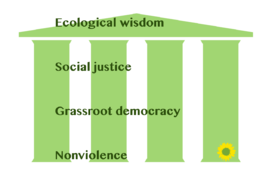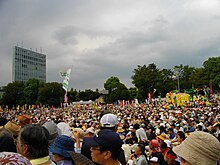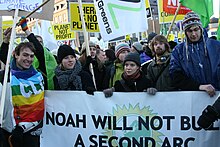Green politics, or ecopolitics, is a political ideology that aims to create an ecologically sustainable society rooted in environmentalism, nonviolence, social justice and grassroots democracy.
It began taking shape in the western world in the 1970s and since then
Green parties have developed and established themselves in many
countries around the globe and have achieved some electoral success.
The political term green was used initially in relation to die Grünen (German for "the Greens"), a green party formed in the late 1970s. The term political ecology
is sometimes used in academic circles, but in the latter has come to
represent an interdisciplinary field of study, as the academic
discipline offers wide-ranging studies integrating ecological social
sciences with political economy
in topics such as degradation and marginalization, environmental
conflict, conservation and control and environmental identities and
social movements.
Supporters of green politics share many ideas with the ecology, conservation, environmentalism, feminism and peace movements. In addition to democracy and ecological issues, green politics is concerned with civil liberties, social justice, nonviolence, sometimes variants of localism and tends to support social progressivism. The party's platform is largely considered left in the political spectrum. The green ideology has connections with various other ecocentric political ideologies, including ecosocialism, ecoanarchism and ecofeminism, but to what extent these can be seen as forms of Green politics is a matter of debate. As the left-wing green political philosophy developed, there also came into separate existence unrelated and polar opposite movements on the right that include ecological components such as green conservatism and eco-capitalism.
Supporters of green politics share many ideas with the ecology, conservation, environmentalism, feminism and peace movements. In addition to democracy and ecological issues, green politics is concerned with civil liberties, social justice, nonviolence, sometimes variants of localism and tends to support social progressivism. The party's platform is largely considered left in the political spectrum. The green ideology has connections with various other ecocentric political ideologies, including ecosocialism, ecoanarchism and ecofeminism, but to what extent these can be seen as forms of Green politics is a matter of debate. As the left-wing green political philosophy developed, there also came into separate existence unrelated and polar opposite movements on the right that include ecological components such as green conservatism and eco-capitalism.
History
Henry David Thoreau, influential early green anarchist who wrote Walden
Influences
Adherents
to green politics tend to consider it to be part of a higher worldview
and not simply a political ideology. Green politics draws its ethical
stance from a variety of sources, from the values of indigenous peoples, to the ethics of Gandhi, Spinoza and Uexküll. These people influenced green thought in their advocacy of long-term seventh generation foresight, and on the personal responsibility of every individual to make moral choices.
Unease about adverse consequences of human actions on nature predates the modern concept of environmentalism. Social commentators as far apart as ancient Rome and China complained of air, water and noise pollution.
The philosophical roots of environmentalism can be traced back to enlightenment thinkers such as Rousseau in France and, later, the author and naturalist Thoreau in America. Organised environmentalism began in late 19th Century Europe and the United States as a reaction to the Industrial Revolution with its emphasis on unbridled economic expansion.
“Green politics” first began as conservation and preservation movements, such as the Sierra Club, founded in San Francisco in 1892.
Left-green platforms of the form that make up the green parties
today draw terminology from the science of ecology, and policy from environmentalism, deep ecology, feminism, pacifism, anarchism, libertarian socialism, social democracy, eco-socialism, and/or social ecology.
In the 1970s, as these movements grew in influence, green politics
arose as a new philosophy which synthesized their goals.
The Green Party political movement is not to be confused with the
unrelated fact that in some far-right and fascist parties, nationalism
has on occasion been tied into a sort of green politics which promotes
environmentalism as a form of pride in the "motherland" according to a minority of authors.
German Green Party co-founder Petra Kelly, first leader and theorist of green politics
Early development
In June 1970, a Dutch group called Kabouters won 5 of the 45 seats on the Amsterdam Gemeenteraad (City Council), as well as two seats each on councils in The Hague and Leeuwarden and one seat apiece in Arnhem, Alkmaar and Leiden. The Kabouters were an outgrowth of Provo’s environmental White Plans and they proposed “Groene Plannen” (“Green Plans”).
The first political party to be created with its basis in environmental issues was the United Tasmania Group, founded in Australia in March 1972 to fight against deforestation and the creation of a dam that would damage Lake Pedder;
whilst it only gained three percent in state elections, it had,
according to Derek Wall, "inspired the creation of Green parties all
over the world." In May 1972, a meeting at Victoria University of Wellington, New Zealand, launched the Values Party, the world's first countrywide green party to contest Parliamentary seats nationally. In November 1972, Europe's first green party, PEOPLE in the UK came into existence.
The German Green Party was not the first Green Party in Europe to
have members elected nationally but the impression was created that
they had been, because they attracted the most media attention: The German Greens, contended in their first national election in the 1980 federal election.
They started as a provisional coalition of civic groups and political
campaigns which, together, felt their interests were not expressed by
the conventional parties. After contesting the 1979 European elections
they held a conference which identified Four Pillars of the Green Party
which all groups in the original alliance could agree as the basis of a
common Party platform: welding these groups together as a single Party.
This statement of principles has since been utilised by many Green
Parties around the world. It was this party that first coined the term
"Green" ("Grün" in German) and adopted the sunflower symbol. The term "Green" was coined by one of the founders of the German Green Party, Petra Kelly, after she visited Australia and saw the actions of the Builders Labourers Federation and their green ban actions. In the 1983 federal election, the Greens won 27 seats in the Bundestag.
Further developments
Marina Silva in the Amazon rainforest
The first Canadian foray into green politics took place in the
Maritimes when 11 independent candidates (including one in Montreal and
one in Toronto) ran in the 1980 federal election under the banner of the
Small Party. Inspired by Schumacher's Small is Beautiful, the Small
Party candidates ran for the expressed purpose of putting forward an
anti-nuclear platform in that election. It was not registered as an
official party, but some participants in that effort went on to form the
Green Party of Canada in 1983 (the Ontario Greens and British Columbia Greens were also formed that year). Current Green Party of Canada leader Elizabeth May
was the instigator and one of the candidates of the Small Party and she
was eventually elected as a member of the Green Party in 2011 Canadian federal election.
In Finland, the Green League
became the first European Green Party to form part of a state-level
Cabinet in 1995. The German Greens followed, forming a government with
the Social Democratic Party of Germany (the "Red-Green Alliance") from 1998 to 2005. In 2001, they reached an agreement to end reliance on nuclear power in Germany, and agreed to remain in coalition and support the German government of Chancellor Gerhard Schröder in the 2001 Afghan War. This put them at odds with many Greens worldwide, but demonstrated that they were capable of difficult political tradeoffs.
Sergio Fajardo, ex-mayor of Medellín; Joschka Fischer, ex Vice-Chancellor of Germany and Femke Halsema, mayor of Amsterdam
In Latvia, Indulis Emsis, leader of the Green Party and part of the Union of Greens and Farmers, an alliance of a Nordic agrarian party and the Green Party, was Prime Minister of Latvia for ten months in 2004, making him the first Green politician to lead a country in the history of the world. In 2015, Emsis' party colleague, Raimonds Vējonis, was elected President of Latvia by the Latvian parliament. Vējonis became the first green head of state worldwide.
In the German state of Baden-Württenburg, the Green Party became
the leader of the coalition with the Social Democrats after finishing
second in the 2011 Baden-Württemberg state election. In the following state election, 2016, the Green Party became the strongest party for the first time in a German Landtag.
In 2016, the former leader of the Austrian green party (1997-2008), Alexander Van der Bellen, officially running as an independent, won the 2016 Austrian presidential election,
making him the second green head of state worldwide, the first directly
elected by popular vote. Van der Bellen became second in the election's
first round with 21.3% of the votes, the best result for the Austrian
greens in their history. He won the second round run-off against the
far-right Freedom party's Norbert Hofer
with 53.8% of the votes, making him the first President of Austria who
was not backed by either the People's or the Social Democratic party.
Core tenets
The four green pillars
According to Derek Wall, a prominent British green proponent, there are four pillars that define green politics:
In 1984, the Green Committees of Correspondence in the United States
expanded the Four Pillars into Ten Key Values which further included:
- Decentralization
- Community-based economics
- Post-patriarchal values (later translated to feminism)
- Respect for diversity
- Global responsibility
- Future focus
The six guiding principles
In 2001, the Global Greens were organized as an international green movement. The Global Greens Charter identified six guiding principles:
- Ecological wisdom
- Social justice
- Participatory democracy
- Nonviolence
- Sustainability
- Respect for diversity
Ecology
Economics
Tim Jackson, professor of sustainable development and Ecological economics at the University of Surrey and author of Prosperity Without Growth
César Rendueles, theorist of Common good (economics) and open content and net neutrality.
Paul Mason, theorist of post-capitalism and Universal basic income.
Serge Latouche, theorist of degrowth
Michael Albert, theorist of participatory economics
Green economics focuses on the importance of the health of the biosphere to human well-being. Consequently, most Greens distrust conventional capitalism, as it tends to emphasize economic growth while ignoring ecological health; the "full cost"
of economic growth often includes damage to the biosphere, which is
unacceptable according to green politics. Green economics considers such
growth to be "uneconomic growth"—
material increase that nonetheless lowers overall quality of life.
Green economics inherently takes a longer term perspective than
conventional economics, because such loss in quality of life is often
delayed. According to green economics, the present generation should not
borrow from future generations, but rather attempt to achieve what Tim Jackson calls "prosperity without growth".
Some Greens refer to productivism, consumerism and scientism as "grey", as contrasted with "green", economic views. "Grey" implies age, concrete, and lifelessness.
Therefore, adherents to green politics advocate economic policies
designed to safeguard the environment. Greens want governments to stop subsidizing
companies that waste resources or pollute the natural world, subsidies
that Greens refer to as "dirty subsidies". Some currents of green
politics place automobile and agribusiness subsidies in this category,
as they may harm human health. On the contrary, Greens look to a green tax shift that are seen to encourage both producers and consumers to make ecologically friendly choices.
Many aspects of green economics could be considered anti-globalist. According to many left-wing greens, economic globalization
is considered a threat to well-being, which will replace natural
environments and local cultures with a single trade economy, termed the global economic monoculture. This is not a universal policy of greens, as green liberals and green conservatives support a regulated free market economy with additional measures to advance sustainable development.
Since green economics emphasizes biospheric health and biodiversity,
an issue outside the traditional left-right spectrum, different
currents within green politics incorporate ideas from socialism and
capitalism. Greens on the Left are often identified as Eco-socialists, who merge ecology and environmentalism with socialism and Marxism and blame the capitalist system for environmental degradation, social injustice, inequality and conflict. Eco-capitalists, on the other hand, believe that the free market
system, with some modification, is capable of addressing ecological
problems. This belief is documented in the business experiences of
eco-capitalists in the book, The Gort Cloud that describes the gort cloud as the green community that supports eco-friendly businesses.
Participatory democracy
Since the beginning, green politics has emphasized local, grassroots-level
political activity and decision-making. According to its adherents, it
is crucial that citizens play a direct role in the decisions that
influence their lives and their environment. Therefore, green politics
seeks to increase the role of deliberative democracy, based on direct citizen involvement and consensus decision making, wherever it is feasible.
Green politics also encourages political action on the individual level, such as ethical consumerism,
or buying things that are made according to environmentally ethical
standards. Indeed, many green parties emphasize individual and
grassroots action at the local and regional levels over electoral politics.
Historically, green parties have grown at the local level, gradually
gaining influence and spreading to regional or provincial politics, only
entering the national arena when there is a strong network of local
support.
In addition, many greens believe that governments should not levy
taxes against strictly local production and trade. Some Greens advocate
new ways of organizing authority to increase local control, including urban secession, bioregional democracy, and co-operative/local stakeholder ownership.
Other issues
Martha Nussbaum, Professor of Law and Ethics at the University of Chicago, is a proponent of the capabilities approach to animal rights
Anna Grodzka, Polish green LGBTI advocate
Anti-Nuclear Power Plant Rally on 19 September 2011 at Meiji Shrine
complex in Tokyo in which sixty thousand people marched chanting
"Sayonara nuclear power" and waving banners to call on Japan's
government to abandon nuclear power following the Fukushima disaster
Although Greens in the United States "call for an end to the 'War on Drugs'" and "for decriminalization of victimless crimes",
they also call for developing "a firm approach to law enforcement that
directly addresses violent crime, including trafficking in hard drugs".
In Europe, green parties tend to support the creation of a democratic federal Europe.
In the spirit of nonviolence, green politics opposes the war on terrorism and the curtailment of civil rights, focusing instead on nurturing deliberative democracy in war-torn regions and the construction of a civil society with an increased role for women.
In keeping with their commitment to the preservation of
diversity, greens are often committed to the maintenance and protection
of indigenous communities, languages, and traditions. An example of this
is the Irish Green Party's commitment to the preservation of the Irish Language. Some of the green movement has focused on divesting in fossil fuels. Academics Stand Against Poverty states "it is paradoxical for universities to remain invested in fossil fuel companies". Thomas Pogge
says that the fossil fuel divestment movement can increase political
pressure at events like the international climate change conference
(COP).
Alex Epstein of Forbes notes that it is hypocritical to ask for
divestment without a boycott and that a boycott would be more effective. Some institutions that are leading by example in the academic area are Stanford University, Syracuse University, Sterling College and over 20 more. A number of cities, counties and religious institutions have also joined the movement to divest.
Green politics mostly opposes nuclear fusion power and the buildup of persistent organic pollutants, supporting adherence to the precautionary principle,
by which technologies are rejected unless they can be proven to not
cause significant harm to the health of living things or the biosphere.
Green platforms generally favor tariffs on fossil fuels, restricting genetically modified organisms, and protections for ecoregions or communities.
Organization
Local movements
Green ideology emphasizes participatory democracy and the principle of "thinking globally, acting locally".
As such, the ideal Green Party is thought to grow from the bottom up,
from neighborhood to municipal to (eco-)regional to national levels.
The goal is to rule by a consensus decision making process.
Strong local coalitions are considered a prerequisite to
higher-level electoral breakthroughs. Historically, the growth of Green
parties has been sparked by a single issue where Greens can appeal to
ordinary citizens' concerns. In Germany, for example, the Greens' early
opposition to nuclear power won them their first successes in the
federal elections.
Global organization
Ashok Khosla was president of the International Union for Conservation of Nature and also worked for the United Nations Environment Programme
There is a growing level of global cooperation between Green parties.
Global gatherings of Green Parties now happen. The first Planetary
Meeting of Greens was held 30–31 May 1992, in Rio de Janeiro,
immediately preceding the United Nations Conference on Environment and Development held there. More than 200 Greens from 28 nations attended. The first formal Global Greens Gathering took place in Canberra,
in 2001, with more than 800 Greens from 72 countries in attendance.
The second Global Green Congress was held in São Paulo, Brazil, in May
2008, when 75 parties were represented.
The sunflower is recognized internationally as a symbol of green politics
Global Green networking dates back to 1990. Following the Planetary Meeting of Greens in Rio de Janeiro,
a Global Green Steering Committee was created, consisting of two seats
for each continent. In 1993 this Global Steering Committee met in Mexico
City and authorized the creation of a Global Green Network including a
Global Green Calendar, Global Green Bulletin, and Global Green
Directory. The Directory was issued in several editions in the next
years. In 1996, 69 Green Parties from around the world signed a common
declaration opposing French nuclear testing in the South Pacific, the
first statement of global greens on a current issue. A second statement
was issued in December 1997, concerning the Kyoto climate change treaty.
At the 2001 Canberra Global Gathering delegates for Green Parties from 72 countries decided upon a Global Greens Charter
which proposes six key principles. Over time, each Green Party can
discuss this and organize itself to approve it, some by using it in the
local press, some by translating it for their web site, some by
incorporating it into their manifesto, some by incorporating it into
their constitution. This process is taking place gradually, with online dialogue enabling parties to say where they are up to with this process.
Federation of Young European Greens demonstration in Copenhagen during the Climate Summit 2009
The Gatherings also agree on organizational matters. The first Gathering voted unanimously to set up the Global Green Network
(GGN). The GGN is composed of three representatives from each Green
Party. A companion organization was set up by the same resolution: Global Green Coordination
(GGC). This is composed of three representatives from each Federation
(Africa, Europe, The Americas, Asia/Pacific, see below). Discussion of
the planned organization took place in several Green Parties prior to
the Canberra meeting.
The GGC communicates chiefly by email. Any agreement by it has to be
by unanimity of its members. It may identify possible global campaigns
to propose to Green Parties worldwide. The GGC may endorse statements by
individual Green Parties. For example, it endorsed a statement by the
US Green Party on the Israel-Palestine conflict.
Thirdly, Global Green Gatherings are an opportunity for informal
networking, from which joint campaigning may arise. For example, a
campaign to protect the New Caledonian
coral reef, by getting it nominated for World Heritage Status: a joint
campaign by the New Caledonia Green Party, New Caledonian indigenous
leaders, the French Green Party, and the Australian Greens. Another example concerns Ingrid Betancourt, the leader of the Green Party in Colombia, the Green Oxygen Party (Partido Verde Oxigeno). Ingrid Betancourt and the party's Campaign Manager, Claire Rojas, were kidnapped by a hard-line faction of FARC
on 7 March 2002, while travelling in FARC-controlled territory.
Betancourt had spoken at the Canberra Gathering, making many friends. As
a result, Green Parties all over the world have organized, pressing
their governments to bring pressure to bear. For example, Green Parties
in African countries, Austria, Canada, Brazil, Peru, Mexico, France,
Scotland, Sweden and other countries have launched campaigns calling for
Betancourt's release. Bob Brown, the leader of the Australian Greens, went to Colombia, as did an envoy from the European Federation, Alain Lipietz, who issued a report. The four Federations of Green Parties issued a message to FARC. Ingrid Betancourt was rescued by the Colombian military in Operation Jaque in 2008.
Global Green meetings
Separately from the Global Green Gatherings, Global Green Meetings take place. For instance, one took place on the fringe of the World Summit on Sustainable Development
in Johannesburg. Green Parties attended from Australia, Taiwan, Korea,
South Africa, Mauritius, Uganda, Cameroon, Republic of Cyprus, Italy,
France, Belgium, Germany, Finland, Sweden, Norway, the USA, Mexico and
Chile.
The Global Green Meeting discussed the situation of Green Parties on the African continent; heard a report from Mike Feinstein, former Mayor of Santa Monica,
about setting up a web site of the GGN; discussed procedures for the
better working of the GGC; and decided two topics on which the Global
Greens could issue statements in the near future: Iraq and the 2003 WTO
meeting in Cancun.
Green federations
Bob Brown at a climate change rally in Melbourne, 5 July 2008
Affiliated members in Asia, Pacific and Oceania form the Asia-Pacific Green Network.
The member parties of the Global Greens are organised into four continental federations:
- Federation of Green Parties of Africa
- Federation of the Green Parties of the Americas / Federación de los Partidos Verdes de las Américas
- Asia-Pacific Green Network
- European Green Party
The European Federation of Green Parties formed itself as the European Green Party on 22 February 2004, in the run-up to European Parliament elections in June 2004, a further step in trans-national integration.
Currents
Murray Bookchin developed the theory of social ecology
Green politics is usually said to include the green anarchism, eco-anarchism, green libertarianism, green liberalism, anti-nuclear movements, and peace movements, although these often claim not to be aligned with any party. Some claim it also includes feminism, pacifism and the animal rights movements. Some Greens support policy measures to empower women, especially mothers, great ape personhood; to oppose war, to de-escalate conflicts, and to stop proliferating technologies useful in conflict or likely to lead to conflict.
Greens on the Left adhere to eco-socialism, an ideology that combines ecology, environmentalism, socialism, and Marxism to criticize the capitalist system as the cause of ecological crises, social exclusion, inequality,
and conflict. Green parties are not eco-socialist, but some Green
parties around the world have or have had a significant eco-socialist
membership.
Despite this stereotype, some centrist Greens may subscribe to a more classical liberal Georgist or geolibertarian philosophy emphasizing individual property rights and free-market environmentalism – and shifting taxes
away from value created by labor or service and charging instead for
human consumption of the wealth created by the natural world.
Greens may view the processes by which living beings compete for
mates, homes, and food, ecology, and the cognitive and political
sciences very differently. These differences tend to drive debate on
ethics, formation of policy, and the public resolution of these
differences in leadership races. There is no single "Green Ethic".
























